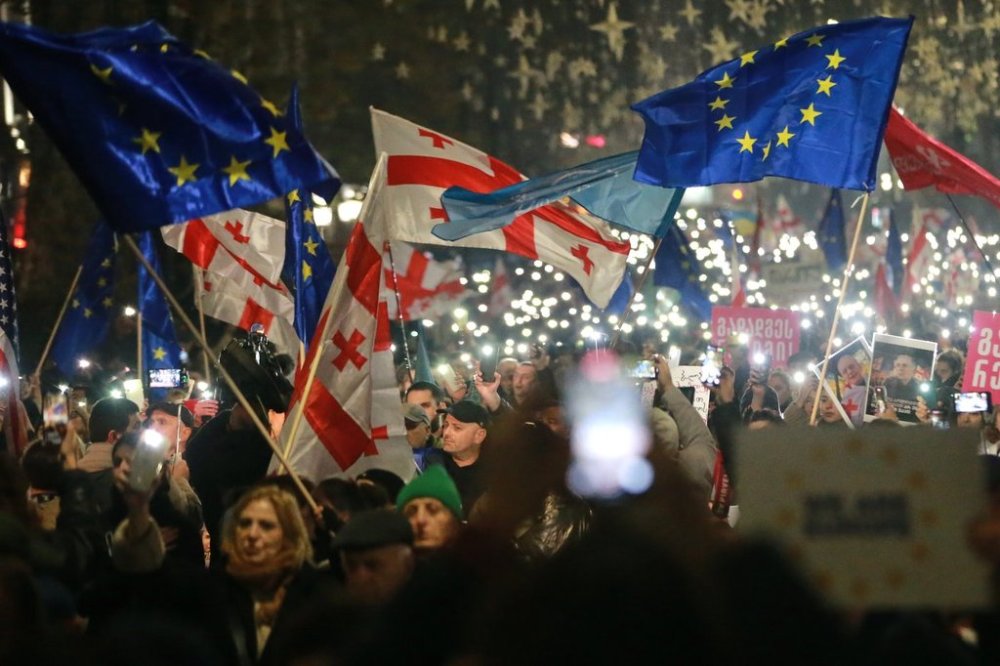Georgia marks a year of protests since EU talks stalled and crackdown intensified
Advertisement
Read this article for free:
or
Already have an account? Log in here »
To continue reading, please subscribe:
Monthly Digital Subscription
$0 for the first 4 weeks*
- Enjoy unlimited reading on winnipegfreepress.com
- Read the E-Edition, our digital replica newspaper
- Access News Break, our award-winning app
- Play interactive puzzles
*No charge for 4 weeks then price increases to the regular rate of $19.00 plus GST every four weeks. Offer available to new and qualified returning subscribers only. Cancel any time.
Monthly Digital Subscription
$4.75/week*
- Enjoy unlimited reading on winnipegfreepress.com
- Read the E-Edition, our digital replica newspaper
- Access News Break, our award-winning app
- Play interactive puzzles
*Billed as $19 plus GST every four weeks. Cancel any time.
To continue reading, please subscribe:
Add Free Press access to your Brandon Sun subscription for only an additional
$1 for the first 4 weeks*
*Your next subscription payment will increase by $1.00 and you will be charged $16.99 plus GST for four weeks. After four weeks, your payment will increase to $23.99 plus GST every four weeks.
Read unlimited articles for free today:
or
Already have an account? Log in here »
TBILISI, Georgia (AP) — Crowds of demonstrators gathered in the Georgian capital of Tbilisi on Friday to mark 365 days of non-stop protests against the government’s decision to halt talks on joining the European Union.
Carrying drums, whistles, placards and flags, thousands of protesters marched along Rustaveli Avenue, the city’s central thoroughfare.
The daily protests began on Nov. 28, 2024, when Prime Minister Irakli Kobakhidze announced the country was halting talks on joining the EU.

Thousands of protesters poured into the streets following Kobakhidze’s speech, rallying outside the parliament building in Tbilisi and staging demonstrations in other cities.
While the size of the rallies has since fallen, demonstrators have continued to gather each day.
Protester Sopo Batilashvili accused the government of taking away “the future our ancestors fought for and that we were proud of.”
Georgia’s ruling Georgian Dream party has tried to curb the movement by tightening rules on public assemblies, as well as passing a wave of laws targeting rights groups, nongovernmental organizations and independent media.
Critics say some have been modeled on legislation passed in Russia, where President Vladimir Putin has harshly stifled dissent.
Wearing face masks, blocking roads or erecting temporary structures now carries up to 15 days of administrative detention for protest participants and 20 days for organizers.
First-time offenders previously faced a fine of 500 Georgian lari ($185). That amount has been multiplied tenfold to 5,000 lari ($1,850). A second offense brings criminal charges.
Hundreds have been detained under the new law. Among them is Rusiko Kobakhidze, a mother of nine and researcher at the Soviet Past Research Laboratory, who has been protesting daily outside Parliament.
Kobakhidze was arrested twice in November for blocking a street during protests and received sentences of one and four days behind bars.
“For my children and grandchildren, I don’t want a country where they cannot speak openly, where they will be treated unjustly and won’t find justice,” she told The Associated Press.
Authorities have also intensified pressure on opposition parties.
Georgian Dream has petitioned the Constitutional Court to ban the country’s three main opposition groups — the United National Movement, Akhali/Coalition for Change and Lelo.
Several opposition leaders are jailed, in exile or facing criminal charges which opponents say are politically motivated.
Tina Bokuchava, chairperson of the United National Movement, said the ruling party founded by Bidzina Ivanishvili, a billionaire who made his fortune in Russia, “is essentially fulfilling every single strategic objective that Vladimir Putin had vis-à-vis Georgia.”
Despite the suspension of accession talks, Georgian Dream officials insist the country’s European path remains unchanged.
“Our foreign policy is EU integration and NATO integration. Nothing has paused and nothing has changed in that regard,” said ruling party lawmaker Mariam Lashkhi.
She added that international pressure should not influence “internal social economic development policy.”
The EU enlargement report issued on Nov. 4 cited democratic backsliding by Georgian authorities. It said their “repressive” actions are “fundamentally incompatible with EU values of democracy.”

